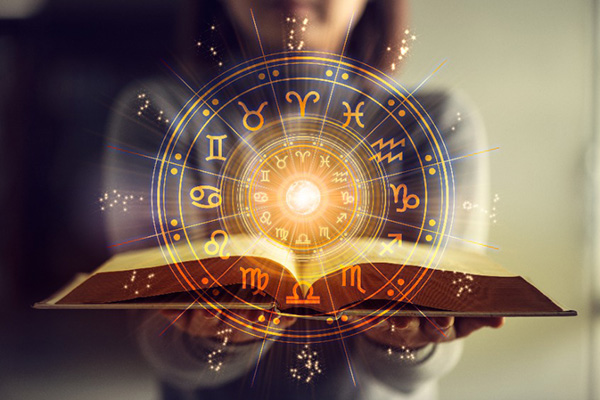A Brief History Of Astrology
 The energies of the planets and stars affect us on many levels every day, whether we were aware of it or not. The earliest humans looked especially to the movements and phases of the Sun and Moon to guide them in their decisions about when to hunt, when to plant and harvest, and when to prepare for winter or migrate.
The energies of the planets and stars affect us on many levels every day, whether we were aware of it or not. The earliest humans looked especially to the movements and phases of the Sun and Moon to guide them in their decisions about when to hunt, when to plant and harvest, and when to prepare for winter or migrate.
From this evolved the practice and study of Astrology. The early civilizations of Mesopotamia were the first to observe the patterns formed by stars in the galaxy as long ago as 3000 BC, while Indian astrology began to emerge as far back as 1200 BC.
The original astrologers identified five ‘wandering stars,’ which together with the sun and moon became the seven original ‘planets.’ More planets were of course identified over time, as technology advanced to introduce the telescope and other astronomical devises.
The Babylonians are generally credited for first developing formal Astrology, because they developed astrological charts to predict the recurrence of the seasons and certain celestial events. Centuries later, Ancient Egypt and Greece discovered Babylonian Astrology, where it soon became highly regarded as a science and was eventually also embraced by the Romans, as well as in the Middle East. In time, its popularity spread throughout the rest of the world. Today, we still use the Roman names for the zodiac signs.
Meanwhile, separate systems of Astrology also emerged in India, China, and Mesoamerica. It remains unclear whether the Babylonian, Indian (known today as Hindu or Vedic Astrology) and Chinese systems of Astrology evolved in isolation and independently, or whether they mutually influenced each other. There are many similarities between these systems, but also many distinct differences. Scholars have been studying and debating this for centuries, but the matter remains inconclusive.
Astrology is assured of recognition from psychology, without further restrictions, because astrology represents the summation of all the psychological knowledge of antiquity ~ Carl Jung
While original Astrology was used mostly to predict seasonal changes and weather patterns, it was soon expanded to predict natural disasters, wars, famines, droughts, and other events significant to human survival. The early astrologers were often so accurate in their forecast that astrology became a sought-after predictive divination tool for emperors, kings, generals, and wealthy civilians.
Throughout history philosophers and scientists not only employed Astrology in their work but held an inherent trust in its reliability and accuracy. Plato, Aristotle, Hippocrates, Confucius, Gan De, Aryabhata, Varāhamihira, Nostradamus, Galileo and even Isaac Newton are just a few of the early philosophers and scientists who relied on Astrology in their work and daily lives.
Western Astrology has through the ages had many reputations, from being an innovative science, to an exalted magic, to evil sorcery, to superstition and pseudo-science. Yet, through its many evolutions and levels of cultural acceptance, it has remained a constant in the quest to reach greater understanding, awareness, and enlightenment, and to successfully navigate an uncertain future.
Condemnation of Astrology sadly began as early as the Graeco-Roman era with, for example, the persecution of Astrologers and their expulsion from Rome in the Late Republic and Early Empire. In time, as Christianity increasingly gained power in the West, all divinatory and metaphysical practices were systematically condemned and excluded, and in many cases, forbidden.
Modern Christianity mostly disputes the notion that it has any association with Astrology whatsoever, but this is not true. In fact, among the earliest Christian leaders and writers it was generally accepted that the planets influenced our lives, they just did not agree on how much Astrology was acceptable for Christians to practice.
Love it or hate it, astrology isn’t going away … but if you give it one honest look, there’s a good chance that you’ll want to know more, because it gives you a feeling that you have the inside scoop — and we all love having the edge on everyone else! ~ Mark S. Husson
Astrology was ultimately condemned officially with the Romanisation of the Christian Church, which began with the reign of Constantine who introduced three major changes to the calendar. He proclaimed Sunday a holy day of worship, created the seven days of the week named after the Roman planetary gods, and invented today’s official Christian holidays like Christmas and Easter based on pagan solar and lunar dates observed in the worship of the Sun, a religious practice that was indigenous to the Romans.
At least one significant reference to Astrology survived in The Bible, namely that of the ‘Three Wise Men,’ who followed a star to Bethlehem to pay their respects to the newborn Jesus. These foreign visitors were however much more than merely ‘wise men.’ They were in fact highly revered Zoroastrianist priests known as magi. The magi were renowned internationally at the time as skilled Astrologers. Various rules of the ancient world consulted the magi, because of their amazing ability to interpret the stars, dreams, signs, and omens. The term magi later became an occult concept, which resulted in the English term magic.
In the King James Version of The Bible the term ‘magi’ became ‘wise men.’ The same translation was applied to the magi who served king Nebuchadnezzar as dream interpreters in the book of Daniel, while in Acts the term mágos (singular for magi) was translated as ‘sorcerer’ to refer to the activist known as Elymas.
With the advent of modern science, Astrology became the foundation for modern Astronomy, while its esoteric, mystical and divinatory aspects came to be regarded as superstition and pseudo-science. Fortunately, centuries of both religious suppression and scientific condemnation did not destroy Astrology and it is still studied and practiced today, along with a host of other divination practices.
In my view, Astrology begins where Astronomy ends. It continues to reveal the effects of planetary influence on a personal, societal, and spiritual level, as we reach to spiral upward through the many cycles and seasons of our lives.
|
|

Leave a Reply